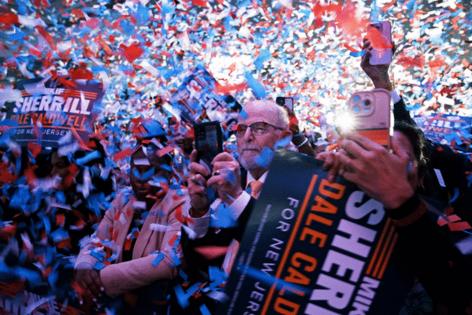How Mikie Sherrill's House seat will be filled after her win in the N.J. governor's race
Published in Political News
Democratic U.S. Rep. Mikie Sherrill came out on top in the race for New Jersey governor, defeating President Donald Trump-endorsed Republican candidate Jack Ciattarelli.
“They always said we’re loud, but man, with this vote you guys just screamed from the rooftops,” Sherrill said following her win Tuesday. “And people around the country have heard it.”
But while her victory settled one high-profile contest, it will also soon result in another — for her seat in the U.S. House. Sherrill represents New Jersey’s 11th Congressional District, which includes parts of several North Jersey counties. She has held her seat in the House since flipping that formerly red district in 2018.
With Sherrill as governor-elect, a special election will need to take place to determine her successor in the House, where Republicans hold a thin majority. When Sherrill will be replaced in the House, however, remains unclear. Sherrill is to be inaugurated as governor on Jan. 20 but could resign from her House seat before that.
“We’ll be working with the leadership in the House as well as our legislature here to, as smoothly as possible, run the special election to get a new person that seat,” Sherrill said at a Wednesday news conference in Trenton, according to a report from the New Jersey Monitor.
Special election rules in the Garden State are complicated and generally result in long timelines for those contests. Even when a special election is needed, state law has no required timeline for when the governor must call for one, the Monitor reported earlier this year.
However, once special elections for House seats are called for, their primary and general portions can take months to run their courses. For example, Gov. Phil Murphy called for a special election in July 2024 following the death of U.S. Rep. Donald Payne Jr. in April, and his eventual successor, former Newark City Council President LaMonica McIver, did not take over his seat until September.
State legislators are considering a bill that would shorten timelines for special elections. But that legislation remains under consideration, and it is unclear if it will be passed in time to affect filling the vacancy Sherrill’s victory will create.
As a result, the timeliness with which Sherrill’s House seat will be filled depends largely upon movement for that bill and when she vacates her seat, New Jersey Globe reported. The earliest we might see a special primary, the publication noted, could be late January or early February.
Murphy, meanwhile, told reporters Wednesday that New Jersey’s process ought to be streamlined, according to a report from the Globe.
“I think we’re fair to say, on the American scale, we’re at the far end of how hard it is, and that doesn’t seem right,” he said.
©2025 The Philadelphia Inquirer, LLC. Visit at inquirer.com. Distributed by Tribune Content Agency, LLC.
























































Comments